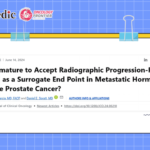
Editor's Note: Multiple studies have demonstrated that both lymph node-positive and lymph node-negative stage II or III HR+/HER2- early breast cancer patients are at risk of recurrence, and the recurrence rate gradually increases over time. At the 2024 ASCO conference, a study conducted a systematic literature review and meta-analysis to evaluate the 3-year and 5-year recurrence risk in early breast cancer patients, emphasizing the need for treatment intensification in specific patient groups. This article provides a summary of the study.Patients with HR+/HER2- early breast cancer (EBC) who have completed adjuvant endocrine therapy (ET) ± chemotherapy (CT) still face the risk of disease recurrence. Despite over 20 years of treatment history, information regarding early recurrence within five years remains relatively scarce. This meta-analysis focused on randomized controlled trials (RCTs) of HR+/HER2- EBC patients, aiming to assess the 3-year and 5-year recurrence risk (RoR) to fill this knowledge gap.
Researchers conducted a systematic literature review, screening phase III RCTs published after 2013 that involved HR+/HER2- early breast cancer patients receiving adjuvant ET. The trials included patients who received 5 years of adjuvant ET (aromatase inhibitors ± ovarian suppression or tamoxifen) ± CT and reported 3-year or 5-year invasive disease-free survival (iDFS) or disease-free survival (DFS). A meta-analysis using a double arcsine transformation random-effects model was conducted to evaluate the 3-year and 5-year RoR in patients with different lymph node statuses.
Data from 14 trials, involving a total of 31,012 patients, were included in the analysis. The overall 3-year and 5-year RoR for HR+/HER2- EBC patients were 7% and 12%, respectively. Specifically, in CDK4/6 inhibitor trials, the 3-year RoR for stage II-III patients was 15%, while the 5-year risk was not reported. Patients with different lymph node statuses showed varying RoR, with 3-year RoR of 5%, 6%, and 13% for N0, N1, and N+ patients, respectively. Sensitivity analysis indicated a decrease in RoR when patients with low to intermediate risk scores were excluded.
The study results indicate that although HR+/HER2- EBC patients may experience late recurrence, the short-term recurrence risk for those receiving ET ± CT remains relatively high, with the risk accumulating over time. This underscores the need for more tolerable treatment options for high-risk patients, particularly lymph node-positive and high-risk N0 patients.


